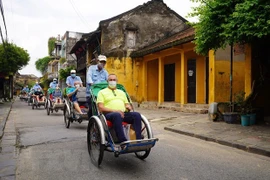 Boats carry tourists on a trip to explore Thung Nang, an attraction in Ninh Binh province (Photo: VNA)
Boats carry tourists on a trip to explore Thung Nang, an attraction in Ninh Binh province (Photo: VNA)Today’s tourism activities focusmore on travellers through data digitalisation, which includes collecting dataabout products, customers, and locations; digitalising data and using digital technologyto analyse customers and business activities; and turning the acquiredinformation into action.
Prof. Doan Thi Hong Van fromthe international business - marketing faculty at the University of EconomicsHo Chi Minh City said digital transformation in the local tourism industry beganin the early 21st century, when the National Administration ofTourism cooperated with Vntrip.vn, the biggest hotel booking website and appsystem in Vietnam, to develop a 360-degree photo app for tourism.
Given the importance ofdigital transformation in fueling tourism recovery, a mobile app named “Du lichViet Nam an toan” (Travel Vietnam safely) was recently launched. The app,combing online tourism, e-payment, and health declaration, targets more than 43million smartphone users, assisting them to seek safe destinations, introducingtourist attractions, and helping with travel demand stimulation.
 A group of tourists visit the My Son Sanctuary, a world heritage site in Quang Nam province (Photo: VNA)
A group of tourists visit the My Son Sanctuary, a world heritage site in Quang Nam province (Photo: VNA)Thanks to digitaltransformation, Travelogy has accessed more customers, improved customerservice, cut down expenses, and increased business efficiency, he noted, addingthat it has also developed software named TravelMaster that includes all thenecessary information about customers so as to minimise data input mistakes.
Chairman of HG Holding NgoMinh Duc said his company began digital transformation five years ago, whenonly few Vietnamese enterprises embarked on this process. In 2020, whenCOVID-19 spread and became complex, it kept focusing on technology to boostdigital transformation.
Experience showed that thereare four important things in digital transformation and digital technologyapplication: developing platform products, creating a cyber ecosystem for the community,authorities’ policies for protecting users, and a good communication campaignto encourage all Vietnamese to prioritise using the country’s products,according to Duc./.





























